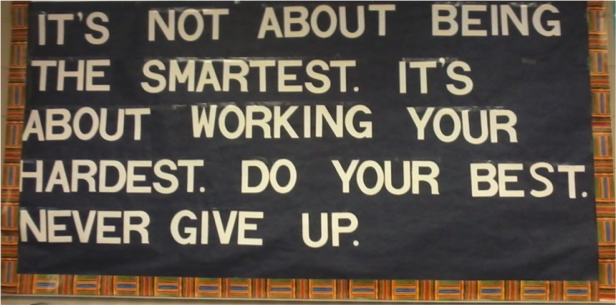Have you ever found yourself in unfamiliar territory, not sure about the challenges ahead? My name is Elke Sündermann, and I had taught elementary school in Arizona for 9 years, after working in the nutrition field for 10 years prior. I decided to move to Tallahassee, to be with the person I loved, leaving friends and a stable job.
Thankfully, I found a teaching job 2 weeks before school started. I was to teach 4th grade, but not a typical 4th grade class. My students were the 17 lowest 4th grade readers. All but 3 had IEPs, many had been retained at least once, and they were all about 2 years below grade level. These kids had the tallest, thickest emotional walls I had ever encountered. Most had very rough home lives, and they all seemed to think that the world had given up on them. They didn’t care about school, they didn’t even look at the corrected papers I passed back, and their favorite comment was, “So? I don’t care.” Everything I taught involved re-teach strategies, and the behaviors were out of this world. These kids were so used to getting negative attention, they operated on that mode constantly. They pushed my buttons every second of every day, and the second that it took for me to blink, at least 2-3 children were throwing paper or rubber bands around the room, invoking the rest of the class to laugh. I realized quickly that this was their coping mechanism, to draw attention away from what they didn’t know, any way they could.
I let them know that I was onto them, and that it was okay not to know everything. It was even okay to be embarrassed and to try to ignore the problem. I told them that I would break through this behavior and help them achieve. I told them they could push my buttons every day, and I would not give up. They still tried, but it got a little better some days. I re-planned my lessons almost every night, to help get academic concepts across to the kids, while rethinking classroom behavior management. I was frustrated most nights, thinking, “What did I get myself into?” Then I ran into an article about HOW to praise students. It changed the way I taught, and it changed how my students thought about themselves.
The article, in a nutshell, said that kids think that being smart is something you either have or don’t. Those who don’t do well in school think that’s not going to change, so they give up. It’s also hard to praise for good grades, when my students were not receiving them on grade-level work. The article encouraged giving praise based on working hard, which is something everyone can do, regardless of IQ or past experiences. Working hard is accessible to every human being.
I started doing this the very next day, with amazing results. I constantly praised the students for working hard, and I didn’t even mention their scores in the comment. Instead of saying, “I’m proud of you for how well you did on that,” I said, “I’m proud of how hard you worked on that.” Kids actually started doing what I expected them to do: work hard. Their assignments actually had “I worked really hard, Ms. Sundermann” in the corners! They started to not only look at their graded work, but comment on how they will work even harder to get a B instead of a C next time. These were the same kids who a week earlier didn’t care how they did, and if they asked about their grade, all they cared about was if it was passing or failing! I couldn’t believe it. Within a week, I made a bulletin board for our new class motto (shown below.) The kids loved it, and reminded each other of it regularly. The same kids who were laughing at others for their faults, were now encouraging each other in how hard they worked!
The grades in my class went from straight D’s and F’s the first quarter, to C’s and D’s the second quarter, B’s and C’s the third quarter, and I even had a couple of kids on the A-B honor roll! We’re in our 4th quarter now, and my students are shining. It has also separated their capabilities, to really help me better see which ones truly have deficits in certain areas, now that they are giving it their all. It’s very hard to see what extra support kids need when they’re barely trying in the first place, and this one change in how I teach and praise has helped so much! Like all teachers, I’m happy that my students will show gains in their state testing scores, but it’s so much more than that. My students made HUGE gains in ways that no test can score. They went from a group of individuals fighting to prove they were better than the rest of the class, trying to hide their learning gaps, to a cohesive group of learners who are not afraid to give or receive help from me or from each other. They went from a group of kids who could barely walk down a hallway without acting out every moment, trying to get attention and making a ruckus everywhere they went, to a group of young people who walk with pride and self-control. They went from being afraid to raise their hand when they didn’t know something, to admitting they need help because they realize there are people who care deeply and are ready to help them when they need it. They went from not caring about themselves or others, to being self-confident and supportive to others.


